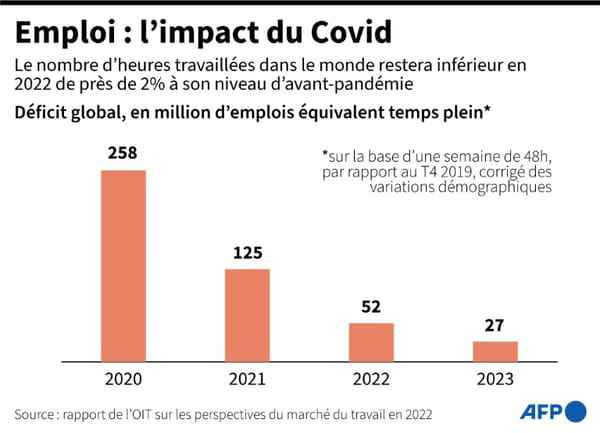The Covid-19 pandemic continues to wreak havoc on jobs around the world and a return to pre-health crisis levels could take years, the UN said on Monday.
The International Labor Organization (ILO) has been forced to revise its forecast for a labor market recovery sharply down this year, in particular due to the impact of the Delta and Omicron variants, which have hit the vast majority of countries hard. in the world.
It now forecasts an overall deficit in hours worked equivalent to 52 million full-time jobs compared to the fourth quarter of 2019. This is twice what the UN organization was still forecasting in May 2021, according to the report on 2022 trends published on Monday.
“Two years after the start of the crisis, the outlook remains fragile and the road to recovery is slow and uncertain,” said Guy Ryder, the director general of the ILO, quoted in a press release.
“We are already seeing potentially lasting damage to the labor market and we are witnessing a worrying rise in poverty and inequality,” Ryder said, giving the example of “many workers who are being forced to move to new types of jobs”, such as in tourism and international travel, hard hit by health restrictions.
The official unemployment rate remains higher than before the pandemic and is expected to remain above until at least 2023.
The number of unemployed for 2022 is estimated by the ILO at 207 million (5.9%), compared to 186 million in 2019.
In 2022, the overall activity rate should remain 1.2 percentage points lower than in 2019, the organization still estimates.
But above all, it underlines that the health crisis – which has already claimed, according to official figures, more than 5.5 million deaths and cost trillions of dollars – has had far more serious effects than the official figures, because they do not include people who have left the labor market.
– Years to fix –
“We will not recover from this pandemic without a far-reaching recovery in the labor market. And to be sustainable, this recovery must be based on the principles of decent work, including health and safety, equality , social protection and social dialogue,” Mr. Ryder warned.
According to the report, North America and Europe show the strongest signs of recovery, unlike Southeast Asia, Latin America and the Caribbean. At the national level, the ILO unsurprisingly finds that “labour market recovery is strongest in high-income countries, while it is weakest in lower-middle-income economies”.
“The disproportionate impact of the crisis on women’s employment is likely to persist for years to come,” the report continues, noting that school closures – sometimes for very long periods – “will have cascading implications term” among young people, especially those who do not have internet access.
For Guy Ryder, “without concerted effort and effective policies at international and national level, it is likely that it will take years in some countries to repair the damage”, with long-term consequences “for the rate of participation, household income but also for social and even political cohesion”.
All rights of reproduction and representation reserved. © (2022) Agence France-Presse

